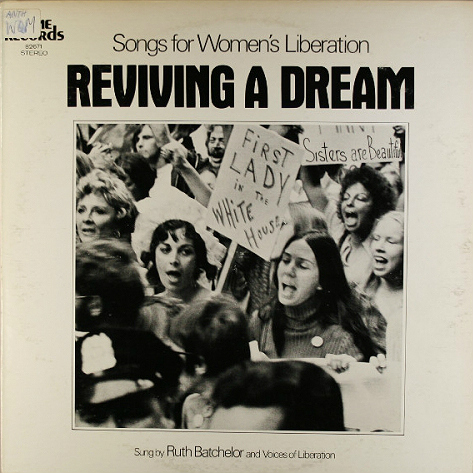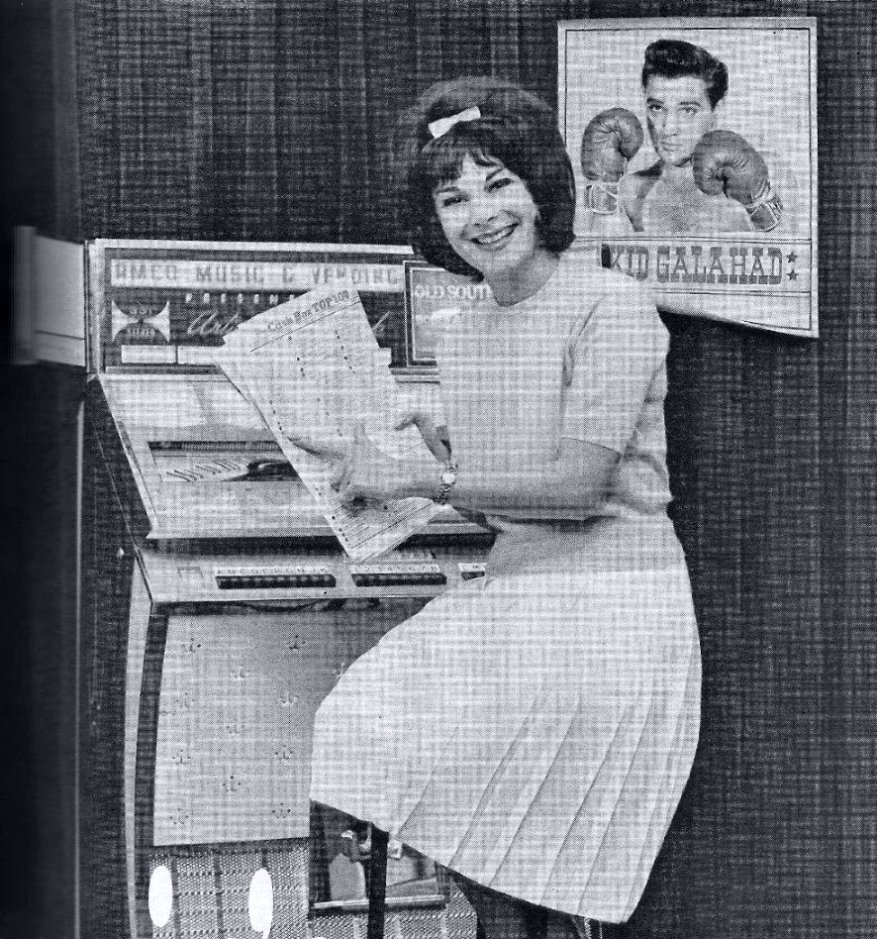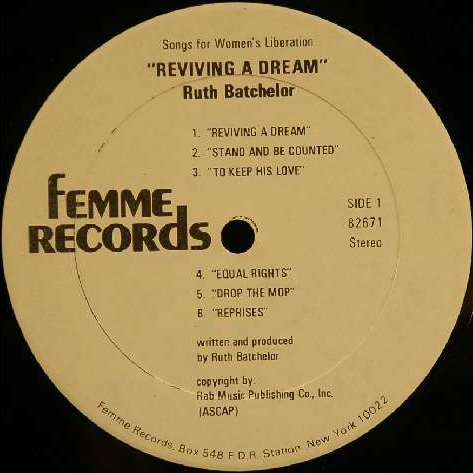Thanks to William Vernola for recommending the 1991 PBS documentary “mini” series, Making Sense of the Sixties. At one point in the accompanying soundtrack — during the examination of women’s rights, undoubtedly — I was hooked by the catchy chorus to a song called “Drop the Mop“:
[Pssst: Click the triangle above to play “Drop the Mop” by Ruth Batchelor]
As it turns out, “Drop the Mop” is the obvious radio hit from feminism’s first full-length record, Reviving a Dream: Songs for Women’s Liberation, issued on the Femme label in 1972 by Ruth Batchelor.
“First Lady in the White House” –
The dream remains…
[This piece originally posted Nov. 12, 2016]
My timing happened be impeccable, as I was able to obtain the one available copy of this now-forgotten record from the Bay Area’s preeminent music store, Amoeba Records, who has this to say about the album:
Unusual album with all original songs’ content centering on women’s liberation, with titles such as – “Drop The Mop,” “Barefoot And Pregnant,” and “Stand And Be Counted.” All the material was written by Ruth Batchelor and sung by Ruth Batchelor & the Voices of Liberation. The back cover has liner notes by Ruth.
How curious that America broke away from the British crown to create “The Land of the Free” — and yet the UK would elect a female head of state decades before the US did (and has yet to do).
WE NEED TO KNOW MORE about THE PRINCESS … about WHAT’S GONNA HAPPEN to us when we’re older … about spending our lives BAREFOOT & PREGNANT … about PROGRESS … about REVIVING A DREAM … we need to STAND AND BE COUNTED … we need to know other ways to KEEP HIS LOVE … we need EQUAL RIGHTS and we need to DROP THE MOP.
A dream was started in 1776 when our Fore-FATHER Thomas Jefferson drew up the Declaration of Independence declaring that all MEN were created equal (while our Fore-MOTHER Betsy Ross was allowed to sew a flag). He didn’t mention WOMEN. Women however were having the same dream – it took them until 1920 to get it realized. The suffragettes suffered and got us the vote. But what have we done with it? Their dream has been asleep for 50 years. The album is our way of REVIVING A DREAM.
[Ruth Batchelor’s original notes from the album’s back cover]
Bob Glassenberg, reporting in his “Studio Track” column for Billboard in the August 28, 1971 edition, would quote the album’s songwriter and organizer-in-chief:
“‘The hardest thing for me as a lyricist is getting the song recorded and then being able to hear the lyrics,’ said Ruth Batchelor, whose current tune, written for the theme of the movie Love Machine, which was sung by Dionne Warwicke, Scepter recording artist. ‘I find it difficult hearing the words from some of the pop groups around today. And I feel this is a pet peeve of many people who write lyrics,’ said Miss Batchelor.
Batchelor has been writing lyrics for quite some time. I couldn’t pin her down as to the length–something to do with disclosing her age. But she is a young lady in any man’s book.
‘Right now I have an album of dirty women’s liberation poems recorded and I’m trying to sell the master. I don’t know who will buy it, because the last company I recorded for folded,’ she laughed. The title of the album is A Quarter for the Ladies Room. But she has written tunes for other artists, such as Elvis Presley, The Partridge Family, Carmen McRae, and Mel Torme. She has had no high school or college education and says her only formal training was a book of Mother Goose Nursery Rhymes.”
Flashback to the early 1970s: Page 6 in the June 1972 issue of Broadside helpfully suggests such “Feminist Gifts” as—
Reviving a Dream (the first feminist record album — for every record sold, a contribution will be made to [National Organization for Women]) and Sexism, the board game, in which a woman tries to make it from the Doll House to the White House while a male chauvinist tries to send her back into the Kitchen or the Typing Pool. Players are forced into situations which necessitate role playing and discussion.
Sexism, the board game
A songwriter and television & radio reporter, Batchelor would found the Los Angeles Film Critics Association in 1975, as pointed out in her 1992 New York Times obituary, and serve as its president and executive director for three years. Twenty years prior, The Times had reviewed Batchelor’s album in its March 12, 1972 edition, though not favorably, I’m afraid. Warren, Pennsylvania’s Times-Mirror and Observer, on the other hand, would be a little more open-minded in its February 3, 1972 edition:
Ruth Batchelor’s name doesn’t make it easy. She is used to bad puns about her name and puts up with them, albeit with clenched teeth. She has trouble with her image, because if she wears her hair in a fall, she is accused of being a sex symbol, and if she wears it short and close cropped, which is comfortable, she is called a lesbian.
Being Ruth Batchelor, songwriter, isn’t easy. Solving the hair problem was relatively simple. When she performs, she wears pigtails, a happy compromise for a girl who comes from California and started her career writing songs for Elvis Presley. Since then she has done the music for three Presley movies; a musical version of Fielding’s Tom Jones for CBS Television; Who’s Afraid of Mother Goose – a TV special with Sherman Edwards [i.e., mastermind behind 1776]; and composed a raft of songs including the theme from Jacqueline Susann’s The Love Machine. It is her most recent accomplishment that she is currently touting.
Miss Batchelor has written the music and lyrics, sung and produced a stereo LP record, her first for her newly-formed record company. Femme Records, called Reviving A Dream: Songs for Women’s Liberation. “And from now on, if I can, I would prefer to write nothing but songs for women,” the slight, dark-haired composer said recently as she sat strumming her guitar in her west side apartment. “I think it’s a great mistake that Women’s Lib has become identified with lesbians,” she said. “I think the image is in trouble. If I weren’t interested in the movement and heard all those anti-men speeches, I’d be turned off, too. I’m not anti-men.”
Among the ten songs on the record are “Barefoot and Pregnant” (“That’s the way my last husband felt about women”); “The Princess,” a song about women s economic dependency (“We need to know other ways to keep his love we need equal rights and we need to drop the mop.”) and, it follows, one called “Drop the Mop.” The first song she thought of for the record was a march. “I felt that NOW (National Organization for Women) needed a march of its own,” she said earnestly. “A march turns a mob into a parade.”
She is a member of NOW. and makes a donation to the organization for each record she sells via mail order [$5 F.D.R. Station. N Y. 10022]. The record from Femme Records, P O Box 548, is also available at Doubleday Stores. Perhaps the most feeling of her songs is called “What’s Gonna Happen,” which she sings in a small voice with echoes of Western music to a guitar accompaniment. The difference between the aging of men and women in today’s society is its subject.
Now that the record is a fait accompli (it was recently bought by the Record Club of .America to be offered to its 2.5 million members), she is busy whipping up others. “On Sunday, I wrote a great song about rape,” she reported, singing a few choruses. “Men always think it is the woman’s fault.” She also rewrote the Lord’s Prayer (“Nothing blasphemous, I just changed it to a woman”). The aim of the game is to get the Women’s Liberation message across, said the divorced mother of two teenage sons. “It’s what I tried to say in the lyrics for ‘The Princess,'” she said. “If you’re pretty, you’ll get a husband, and he’ll take care of you for the rest of your life. That’s the American dream. The only thing is, it isn’t a dream, it’s a nightmare.” Because you care about other people’s feelings, because you know how important it is to tell them they’re needed, wanted, loved.
Ruth Batchelor in pigtails –
images from back cover
To those who view the issue of women’s rights and equality an amusingly antiquated notion, one should consider the fact that women — (a) could not serve on a jury until 1973; (b) could not keep their job while pregnant until 1987; (c) could not pay a man’s rate for health insurance until 2010’s (now-vulnerable) Affordable Care Act (d) could not get credit cards in their name until 1974’s Equal Credit Opportunity Act, and (e) still are not paid the same as their male counterparts, despite the number of women-only households with children.
Ruth Batchelor, 1963 –
(courtesy of Shelley Fabulous)
Ruth Batchelor Songs:
A Selected Discography
- “I’d Like to Miss My Graduation” Karen Lake 1961
- “Mr. Principal” Ruth Batchelor 1962
- “Thanks to the Rolling Sea” Elvis Presley 1962
- “Where Do You Come From” Elvis Presley 1962
- “Because of Love” Elvis Presley 1962
- “King of the Whole Wide World” Elvis Presley 1962
- “More Than a Friend” Larry Collins 1962
- “True Love (Means More Than Anything)” April Stevens & Nino Tempo 1962
- “The Hermit of Misty Mountain” Ben E. King 1962
- “The Best Man Cried” Clyde McPhatter 1962
- “The Tears You Never Cried” Johnny Victor 1962
- “Red Checked Tablecloth” Walter Brennan 1962
- “Gonna Get Some Records” Sandy Selsie 1962
- “The Answer Is No!” Keith Powell & the Valets 1963
- “The Last of Larry’s Goodbyes” Shirley Shirley 1963
- “How Do You Fall Out of Love” Burl Ives 1963
- “Sour Grapes” Patsy Ann Noble 1963
- “Live Now and Pay Later” Doug Sheldon 1963
- “Miss Dynamite” Kathy Kirby 1963
- “Cotton Candy Land” Elvis Presley 1963
- “Echoes of Love” Elvis Presley 1964
- “Surf and Shout” The Isley Brothers 1964
- “Go (Go On, Get Out of Here) Billy Adams 1963
- “Go (Go On, Get Out of Here) Claudie Dorel 1964
- “Send Her to Me” Johnny Thunder 1964 [with Bert Berns]
- “Manha de Carnival (Where Did It Go)” Carmen McRae 1964 [with Luiz Bonfa]
- “Winter in May” Carmen McRae 1964
- “Ballad of Tom Jones” (from Tom Jones) Carole Shaw & Bob Roman 1964
- “When Sonny Comes Strolling Home Again” Clarence Hill 1965
- “There Is No Right Way” Irene Kral 1965
- “Gabrielle” The Hooten Singers 1965
- “Little Boy Bad” Clea Bradford 1965
- “Table for Two” Ruth Brown 1965 [with Kenny Rankin]
- “Haven’t We Met” Mel Torme 1965
- “Haven’t We Met” Kenny Rankin 1966
- “Stay (Reste)” Lana Cantrell 1966
- “Miss Dynamiet (Miss Dynamite)” Karin Kent 1966
- “I Will Follow (Stagecoach Theme)” The Brandywine Singers 1966
- “Haven’t We Met” Kenny Rankin 1966
- “Send Her to Me” Gary “U.S.” Bonds 1967
- Who’s Afraid of Mother Goose? TV musical 1967 [with Sherman Edwards]
- “He’s Moving On (Love Machine Theme) Dionne Warwicke 1971
- “Right On” Maxine Weldon 1971
- “Haven’t We Met” Kenny Rankin 1974
Ruth Batchelor Trivia
Phil Spector produced “I’d Like to Miss My Graduation,” a 1961 single for Karen Lake that was written by Ruth Batchelor — very likely her first professional composition.








2 Responses
Simply put, a tremendous song.
written by a women way before her time, and oh what a vision she must have had!
She was already rich and famous when had twin boys by George Batchelor. It’s just so sad she only kept son Doug. It’s a shame they didn’t get to meet until their 50’s. The bond between twins~I can’t imagine a parent voluntarily severing that at birth.
I’ve been looking online, and no one seems to have explained why this happened.